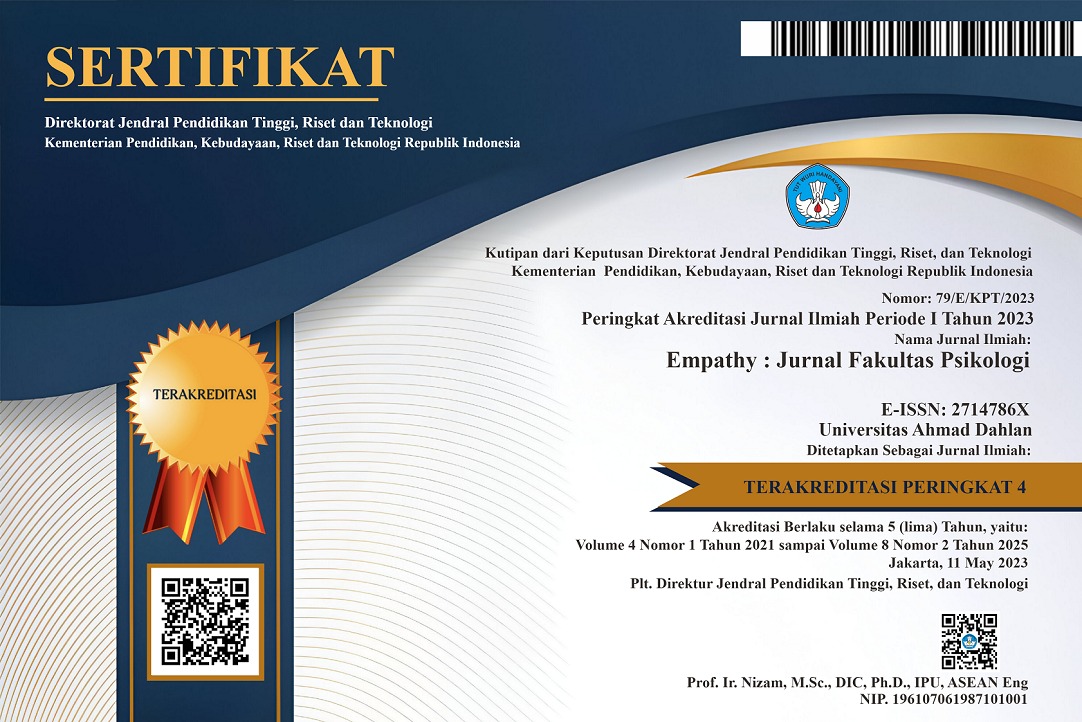Kepercayaan Diri dan Dukungan Sosial dengan Kemandirian pada Mahasiswa Perantauan
DOI:
https://doi.org/10.12928/empathy.v5i2.23686Keywords:
Independence, self-confidence, social supportAbstract
Self Confidence and Social Support with Independence for Overseas Students
Self-confidence and social support with independence in overseas students. This study aims to examine the relationship between self-confidence and social support with independence in overseas students. The subjects in this study were 110 overseas students from the 2019 faculty of psychology, Ahmad Dahlan University. The research method used is quantitative method with measuring instruments used are independence scale, self-confidence scale, and social support scale. The data analysis used was multiple linear regression analysis technique using the Statistical Product and Service Solution (SPSS) 16.0 for windows computer program. The results of the major hypothesis obtained a regression value of R = 0.609 with p = 0.003 (p <0.05). This shows that there is a very significant relationship between the variables of self-confidence and social support with independence. The first minor result is r = 0.578 with p = 0.000 (p <0.01), meaning that there is a very significant positive relationship between self-confidence and independence. Furthermore, the second minor result is r = 0.062 with p = 0.473 (p <0.05), meaning that there is no relationship between social support and independence. Based on the results of this study, it can be concluded that the self-confidence variable provides an effective contribution of 35.08% to independence.
References
REFERENSI
Ali, L. (1995). Kamus besar bahasa Indonesia. Jakarta : Perum Balia Pustaka.
Basri., H. (2000). Remaja berkualitas problematika remaja dan solusinya. Yogyakarta: Pustaka pelajar.
Bramagara. A. (2015). Kesehatan untuk kehidupan mahasiswa perantauan. https://www.kompasiana.com/bramagara/54f9198ca3331100448b4b99/kesehatan-untuk-kehidupan-mahasiswa-perantauan# (Di akses 11 Desember 2019).
Chandra, P.E. (2004). Trik bisnis menuju sukses. Yogyakarta: Grafika Indah.
Fauzia, N., Asmaran & Komalasari, S. (2020). Dinamika Kemandirian Mahasiswa Perantauan. Jurnal Al Husna. Desember 2020, Vol. 1, No. 3, Hal 167-181.
Fitriana, Q.A., (2108). Studi Fenomenologi Penyesuaian Diri Mahasiswa Baru Perempuan Pada Program Studi Teknik Nuklir Universitas Gajah Mada.
Fitroni. M. A., (2019). Permasalahan Yang Dihadapi Mahasiswa Baru Dalam Menjalani Kehidupan Di Universitas Negeri Malang. Study Penelitian. Malang.
Hakim, T. (2002). Mengatasi rasa tidak percaya diri. Jakarta: Puspa Swara
Irene, L. (2013). Perbedaan tingkat kemandirian dan penyusaian diri mahasiswa perantauan Suku Batak ditinjau dari jenis kelamin. Jurnal Psikologi. Vol.01. Surabaya: Universitas Negeri Surabaya.
Ishak, (2018). https://pontianak.tribunnews.com/2018/11/17/suka-duka-mahasiswa-perantau-hal-yang-menguatkan-demi-masa-depan-lebih-baik (Diakses 17 November 2018).
Lauster, P. (2003). Tes kepribadian (alih bahasa: D.H. Gulo). Jakarta. PT.Bumi Aksara.
Lingga, W.W.L. & Tuapatinaja, J.M.R. (2012). Gambaran Virtue Mahasiswa Perantau. Jurnal Predicara. Vol 1, No. 2, Desember 2012.
Monks, F.J., Knoers, A. M.P., Haditono, S.R. (1999). Psikologi Perkembangan: Pengantar dalam berbagai bagiannya. Yogyakarta: Gadjah mada University Press.
Nurhayati, E. (2016). Psikologi Pendidikan Inovatif. Yogyakarta: Pustaka Belajar.
Permata, D, C & Listiyandini, R, A (2015). Peranan Pola Asuh Orang Tua dalam Memprediksi Resiliensi Mahasiswa Tahun Pertama yang Merantau di Jakarta. Jurnal Prosiding PESAT (Psikologi, Ekonomi, Sastra, Arsitektur & Teknil Sipil). Vol. 6, Oktober 2015.
Santrock, W. J. (2002). Life – span development : Perkembangan masa hidup edisi kelima jilid 2. Jakrta : Erlangga.
Suryandari, N., (2016). Culture Shock Communication Mahsasiswa Perantauan di Madura.
Taylor, S. E., Peplau, L. A., & Sears, D. O. (2009). Psikologi Sosial. Edisi XII. Jakarta: Kencana.
Downloads
Published
Issue
Section
License
Authors who publish with Empathy: Jurnal Fakultas Psikologi agree to the following terms:
- Authors retain copyright and grant the journal right of first publication with the work simultaneously licensed under a Creative Commons Attribution License (CC BY-SA 4.0) that allows others to share the work with an acknowledgment of the work's authorship and initial publication in this journal.
- Authors are able to enter into separate, additional contractual arrangements for the non-exclusive distribution of the journal's published version of the work (e.g., post it to an institutional repository or publish it in a book), with an acknowledgment of its initial publication in this journal.
- Authors are permitted and encouraged to post their work online (e.g., in institutional repositories or on their website) prior to and during the submission process, as it can lead to productive exchanges, as well as earlier and greater citation of published work.

This work is licensed under a Creative Commons Attribution-ShareAlike 4.0 International License.



